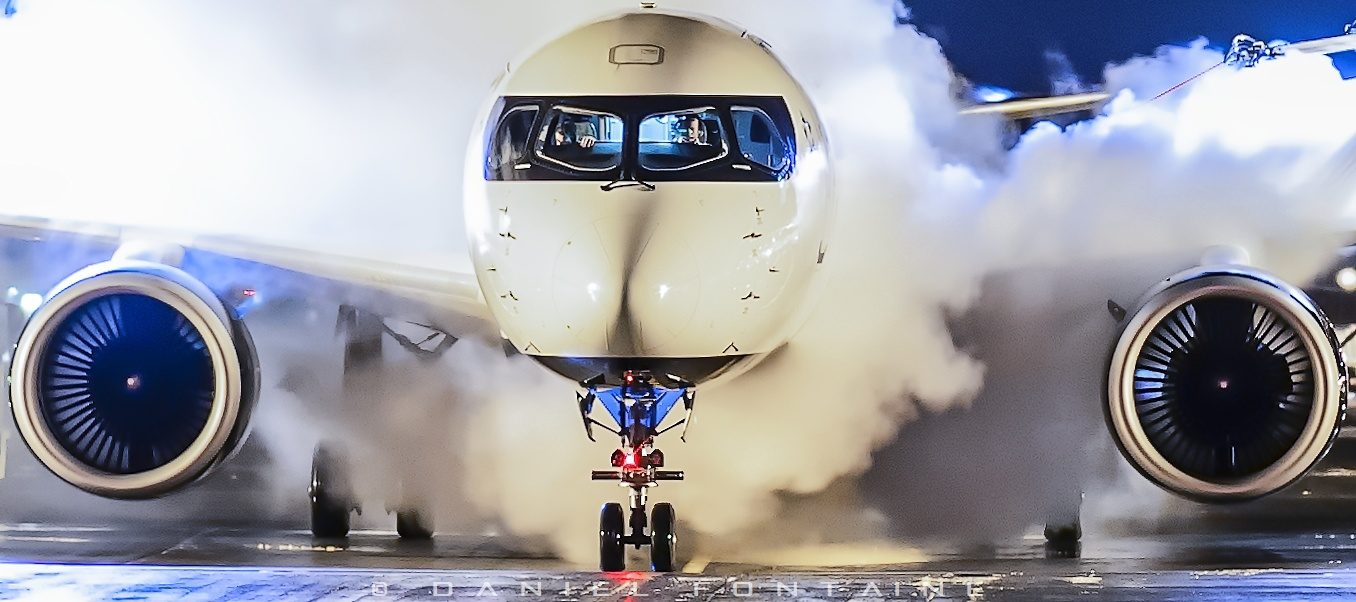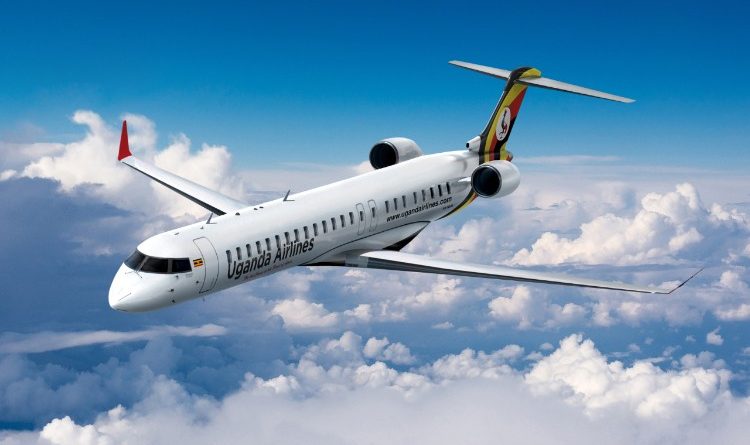$ 27.7 million for a CRJ-900?
According to the website allafrica.com, the Ugandan government has paid a unit price of $ 27.7 million for the acquisition of 4 CRJ-900 for Uganda’s National Airlines.
The article quotes Uganda’s transport minister Monica Azula Ntege as saying that this is the price her government will pay for the CRJ-900s. This amount appears to be a $ 5 million to $ 7 million premium over the commercial value of the CRJ-900, which normally ranges from $ 20 million to $ 22 million. The fact that it is an order of only four aircraft could explain this price difference.
The Ugandan government had issued a tenders from OEM to purchase regional and long-haul aircraft for the Ugandan national carrier to be launched in 2019. Airbus and Boeing had submitted an offer for a long-haul aircraft. But Bombardier would have been the only one to submit an offer for regional aircraft. Embraer’s abstention seems very surprising and puzzled us, given the higher profit margin of this kind of order.
To reed tje All Africa article, click here
>>> Follow us on Facebook and Twitter


8 Reasons why the revived Uganda Airlines is doomed to fail.
A report from an insider whistle blower
1. Dubious facts of who truly are the owners of Uganda Airlines. Publicly it is claimed that Uganda Airlines is co-owned by the Uganda Ministry of Finance in conjunction with the Uganda Ministry of works. However many of us insiders within Uganda Airlines doubt the validity of this claim and have forever questioned why Export Development Canada (EDC) had pulled out from financing the purchase of Uganda Airlines fleet from Canada’s Bombardier Aircraft Manufacturers. Reasons put forward by Aviation experts and Uganda Airlines insiders point to the feasibility study for the business viability of Uganda Airlines that was littered with facts doctored through personnel from Uganda Bureau of statistics so as to influence and justify the revival of the Airline. (In this feasibility study it had projected that Uganda Airlines would start making profits after two years of operation. Now that projection has recently been contradicted when Cornwall Muleya the technical advisor to Uganda Airlines presented to the Uganda Parliament that it would be 9 years before profits are seen. Even the total operations costs presented by Muleya was not the same as in the feasibility study) Another Possible reason for EDC’s pulling out could have involved the confusing true ownership of Uganda Airlines which had discrepancy with the dates of register and the variant names for the registration of the company with the Uganda Registry Bureau Service. In which Uganda Airlines parent company is known as ‘Uganda National Airline Company Ltd’ and its association with another company known as ‘Uganda Airlines Holdings Ltd’ as well as pre registration names with a similar company known as ‘Uganda National Airlines Ltd’ which is now operating under the name ‘Ugand Airlines’ instead of the publicly known national carrier name of ‘Uganda Airlines’. Email Queries sent to EDC by some insiders like me on why they pulled out from Financing Uganda Airlines was re-directed to the Canada Ministry of Foreign Affairs whom also declined to speak on the matter. Following EDC’s pull out, a Ugandan delegation headed by the Ugandan President’s brother in law, Sam Kutesa (also Uganda’s Minister of foreign Affairs with a reputation as a crooked investor and owner of multiple businesses in the Uganda aviation industry) flew to India, China and Qatar to seek financing for the jets. It is not however clear who has truly ended up financing Uganda Airlines, but publicly it is claimed that the Uganda Government is the financier after Uganda Parliament in late July of 2019 sought to approve a supposedly 586Bn UGX supplemental budget for Uganda Airlines. It is also common Insider knowledge that the Ministry of works under the weak and useless Minister Azuba Ntege, has no influence at all on Uganda Airlines matters other than by the ministerial docket where the company falls under Uganda Civil Aviation hence the Ministry of works. The actual bodies wielding power over Uganda Airlines are elements within the Ministry of Finance and State House of Uganda.
2. Contradicting details to the true pricing of what Uganda Airlines really paid for their CRJ900 Bombardier jets. It is estimated by international aviation experts that Uganda Airlines over paid by 30% of the market value of the CRJ900. Whereas other airlines like American Airlines and Air Canada Express had paid $18 Million for each CRJ900, with most customers paying between $20 and $22 Million. Uganda Government claims to have paid $28 Million for each jet, for which aviation insiders disagree with the claim and assert that Uganda actually paid way more than $28 Million for each CJR900. Even though Bombardier has a list price of $45 Million for the CRJ900, its true market value is only $24 Million. (See link #2 at bottom of this article for CRJ900 pricing information). There is a price discrepancy between what the Ugandan Government publicly claims to have paid for the Jets and what Bombardier truly sold the Jets to Uganda for. It was hoped that The Uganda Parliament was going to demand from the Canada Government that Bombardier produce the real bill of sale for the CRJ900’s, but with a weak political opposition in the Uganda parliament they simply have not done that. So the question of what Uganda Airlines truly paid for the CRJ900 jets remains unanswered. After the technical director had made a finance proposal to Uganda parliament claiming no profits until 9 years later there is great worry that Ugandans not only will be stuck with an exorbitant bill but as employees we will not have pensions payments nor benefits.
3. Direct patronage and political interference in Uganda Airlines affairs from Ugandan president Yoweri Museveni and other Ugandan Government Officials. The Uganda President instead of putting out as an open job competition for the position of CEO of Uganda Airlines instead sought to handpick Ephraim Bagenda from Rwand Air to be the CEO of Uganda Airlines. Ephraim Bagenda known by employees of Rwand Air as an incompetent, egotistic CEO that is caught up with his own self importance is said to have no loyalties to Uganda but rather to Rwanda. Bagenda also symbolizes as one of the many grievances that has cumulated to the recent bad blood between Uganda and Rwanda. Although Rwand Air and its employees were glad to get rid of Ephraim Bagenda for which they blame his incompetent leadership for the financial losses suffered by Rwand Air, the Rwanda political apparatus was displeased and perceived the handpicking of Bagenda as Uganda Airline’s CEO as a provocation to Rwanda by Uganda’s President Museveni. They wondered why the CEO of an Airline like Rwand Air that has a reputation for nearly bankrupting its financier, the Rwanda Government should be selected as the CEO of a new Airline by Museveni. It was also in 2012 When Bagenda the then CEO of Rwand Air purchased the CRJ900 Jet from Bombardier at a whopping $44.5 Million. Rwanda Citizens have been left to foot the overage bill for either Bagenda’s deliberate incompetency or Bagenda’s corrupt nature in getting a commission for the purchase of these aircrafts at exorbitant prices. Then in 2018 Again thru Uganda Airlines, Bagenda takes us back to Bombardier at 30% higher than market value. One then has to wonder what relationship Bagenda has with Bombardier and why African Airline Companies run by Bagenda end up getting stiffed with over pricing and yet First world Countries get deals at 30% below market value. If Rwand Air sold its CRJ900 today, it will only be worth $10 million and yet Rwanda Air still owes over 15$ million on their CRJ900. With the departure of Bagenda from Rwand Air and replaced by current CEO Mazi Makolo, Rwanda Air immediately within a year received an award for one of the most improved airlines.
4. Cronyism and bribery in the hiring of executives in Uganda Airlines that were hired based on whom they knew rather than what they know. Bagenda who is said to be a Ugandan and not a Rwandese, on his appointment as CEO, quickly brought to Uganda Airlines some of his Rwand Air employees to include Michael Etiang, Henry Rutasirye and others. Etiang was brought in as chief pilot and Rutasirye to be brought in as IT director to replace a Don Mubiri. (Etiang is highly respected by employees as a professional Pilot while Don Mubiri is widely known as severely under qualified and dangerously incompetent) Many of the under qualified executives to include Jenifer Bamutaraki, Michael Kaliisa, where appointed by patronage influence of Uganda Government officials, executives like Don Mubiri, Bruno Oringi were brought in by Cornwall Muleya the technical advisor for Uganda Airlines (Muleya was also CEO of the defunct Air Uganda where both Mubiri and Oringi were his employees) Other Executives like Moses Wangalwa, Paul Turacayisenga, James Sebbowa, Henry Kalama, Patrick Okema, Kenneth Kiyemba etc were brought into Uganda Airlines based on hand shake deals and recommendations by the other executives and government officials. Most of these executives did not get their jobs in Uganda Airlines though competitive job competition but rather through appointment based on whom they knew. Then there is the distinct and obvious tribalism, nepotism and regionalism where most of the choice jobs within Uganda Airlines are being awarded to unqualified applicants who hail from the western region of Uganda. Some insiders took to social media as to why Uganda Airlines only advertised job positions in Western and Central Uganda. They neglected Northern and Eastern Uganda. Whereas media outlets like radio stations, online publications, newspaper with access to Western and Central Uganda had adverts for Uganda Airlines jobs, the Northern and the Eastern region of Uganda were cut out.
5. The intentional and systematic exclusion of aviation professionals from the Uganda Diaspora living in the first worlds. Despite the many Ugandans in Diaspora who have worked in the aviation industry in the first worlds like the UK, USA, UAE, Sweden, etc and have extensive international experience, Uganda Airlines executives have systematically excluded these Ugandan Diaspora to fill their own job ranks with mostly local and regional personnel only. There is an unwritten rule within Uganda Airlines to avoid short listing applicants who have experience from first worlds. It is silently claimed that this is to preserve the harmony between employees, and prevent clash of cultures based on differing work cultures where first world work cultures will clash with African work culture of Uganda. Also there is the unwritten belief that the first world applicants would demand for a higher remuneration than their 3rd world counterpart. For this, they avoid hiring aviation experts from first worlds. We all know that these Ugandan executives do not want competition with Diaspora experts that may be more competent than they are. The airlines business is a tough global industry where Uganda Airlines can well benefit from having employees with experience from the first world countries. For instance they would sooner hire a pilot native from India or South Africa than a Ugandan Diaspora pilot from Sweden or Canada.
6. Confusion and discontentment with the leadership of Uganda Airlines. It is an open secret within Uganda Airlines that even though Bagenda is the CEO of Uganda Airlines, the true person pulling the strings of power at Uganda Airlines is Cornwall Muleya. Bagenda being incompetent was totally dependent on Muleya from the onset. Even though Muleya was supposed to be a temporary external consultant on technical matters, he took advantage of Bagenda’s weakness in leadership and quickly exerted his authority over Uganda Airlines. Currently there are silent but obvious divisions in Uganda Airlines leadership structure as there are those employees loyal to Muleya, and those loyal to Bagenda. This explains why Bagenda wants to bring in Rutasirye to replace Mubiri who is a Muleya loyalist and plain obvious to everyone in the company that Mubiri is way in over his head for his position. There are also great resentment from some Ugandan employees towards both Muleya and Bagenda, for whom they feel are foreigners hence lack the nationalistic feeling for the success of Uganda Airlines and should not be at the helm of Uganda Airlines. This sentiment is also held by many Ugandans in Diaspora within the Aviation Industry who feel cheated of the chance to compete for these jobs, since most of the executive positions were appointed rather than openly competed for. The recent job postings for various vacancy positions within Uganda Airlines is a complete farce as most middle and upper level positions are already handpicked with every of the executives bringing in their Resume’s of their people by hand for consideration. Online submissions for jobs within Uganda airlines are a waste of time except for low positions. It is only an exercise to appear professional to stave off the critics about tribalism, cronyism etc.
7. Corruption and incompetency in awarding of contracts based on handshakes and whom one knows. Uganda Airlines should at once install through its website an open and public bidding and tender process to stave off the corruption and bribery thru the award of contracts. Presently Uganda Airlines does not have a proper bidding and tendering system. It appears that every executive is recommending their own private companies for contract awards. The procurement and disposal executives like Patrick Okema, do not have the final authority on contract awards. Most local contracts within Uganda are being awarded to broker or consulting companies (middle men companies without the real product or service required) that are close to Uganda Government officials or close to the executives of the airline. International contracts are being awarded to companies either close to Muleya or close to Bagenda. But companies referred by Muleya have a better chance of getting contracts with Uganda Airlines than companies close to Bagenda. Bagenda although not competent, is less corrupt than Muleya. Muleya is the deal maker and contract recommender such that only international companies approved by Muleya have a good chance of getting contracts with Uganda Airlines. Imagine this level of incompetence: from Flight Departure Control systems, Catering services, Airline Uniforms, Revenue Accounting system, Booking and flight Schedule systems, Front and Back Office applications etc have never been publicly tendered for and yet companies close to these executives have already been awarded. One wonders how these companies got to know when and how to bid for these contracts. Take for instance two weeks ago when Uganda Airlines wanted to buy 30 computer terminals. Instead of the procurement dept doing this through an open and bidding and tender process, it is the various executives sending out private invite emails using yahoo and gmail to individual companies close to them. Some of these bids are sickening to read and come by fax. Old expired computer terminals that cost over 3 times the open market are being submitted as quotes or bids for the 30 computer terminals. All this happens under the watch of the incompetent CEO Ephraim Bagenda.
8. Lack of knowledge in leveraging the proper use of an online website and taking advantage of Social Media presence. Many of us insiders have complained as to why Uganda Airlines website was a blank page with just a countdown clock. We had advocated that the incompetent IT manager known as Don Mubiri should have had some fresh content on our website to harness the impetus of visitors after announcing of the revival of Uganda Airlines. They could have had a blog section that would update the world on the progress or delay in our operations. Instead they only used twitter that has a limited capacity for information. Many news outlets were able to write our story instead of letting us write our own stories on our blogs. They could have used the company website to set up a bids and tendering process just like they did for the careers board. Now even before we are operational, there is a lack of confidence within the company as critics accuse the company of cronyism, corruption and incompetency. Even before operations have began, Uganda Airlines has failed to use their website to get the best deals from service providers, they have started wasting tax payers money with needless conferences at expensive hotels like Protea, use of expensive catering services like Newrest catering when they could have chosen more moderate and less costly alternatives. Uganda Airlines has numerous social media accounts and numerous websites that it is impossible to know which one is which and which is active or expired. They should move to consolidate their online activities to ensure that it is coordinated properly. It is plain for all to see that the Uganda Airlines online presence is run my unqualified personnel with inferior skills in IT as various social media accounts have not been consolidated.
1 – http://www.aircraftvaluenews.com/values-of-crj900-continue-to-tumble/
2 – https://pricesana.com/uganda-airlines-bombardier-crj900-aircraft/